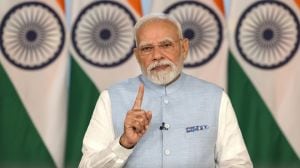Pak agents are ‘active’, so Army bans cellphones
Sticken by a morbid fear of Pakistani intelligence penetrating the military establishment, the Army headquarters has said no to official mob...

Sticken by a morbid fear of Pakistani intelligence penetrating the military establishment, the Army headquarters has said no to official mobile phones. It has also asked all Army personnel — this includes senior generals, their spouses and dependents — to register private cellphones with local headquarters.
To top it, even the facility for civilian dialling to Army exchanges, called direct inward-dialling in forces’ parlance, stands indefinitely suspended since last month.
The inward-dialling facility, restored after Operation Parakram last year, was again suspended for ‘‘security reasons.’’ The Navy and the Air Force, on their part, have been blocking the inward-dialling facility ever since the December 13, 2001, terrorist attack on Parliament.
While Army headquarters refuses to spell out the ‘‘security reasons,’’ it is learnt that the military establishment took the step after some officers of the Western Army Command received unidentified ‘‘crank calls’’ on their mobile phones and official exchange numbers, the callers inquiring names of formation commanders.
These calls were perceived to have been made by Pakistani intelligence who were apparently trying to study orbat (order of battle) changes post-Parakram. It is another matter that names of formation commanders figure as a matter of routine in local newspaper reports.
Soon after these unidentified calls, the Chandimandir-based Western Army decided to withdraw the inward-dialling facility to its command exchanges.
This had a cascading effect: the Central, Southern, Northern, Eastern and Training Commands and ultimately the Army headquarters in South Block all suspended the facility.
But the matter didn’t end here. On February 28, Director General, Military Intelligence, Lt General O S Lochhab issued a general security directive to all military intelligence units with Army commands, asking Army officers to avoid using mobile phones.
It is learnt that Lochhab, due for retirement this month and likely to be succeeded by Lt General Richard Khare, said that conversation on mobile phones were not secure as its ‘‘frequency interferes with several other frequencies.’’
The DGMI directed his intelligence units to ensure that mobile phones are not issued to any officer from government funds. This directive was based on a Finance Ministry circular which restricts expenditure on official mobile phones.
Lochhab also made it clear that private mobile phones of Army officers would have to be registered with local headquarters. Even spouses and dependents with mobile phones would have to follow suit.
The buzz is that Army intelligence wants to play Big Brother, even keep tabs on mobile phones of its officers, spouses and kids. And they have a ready justification: some Pakistani agents have been ‘‘very active’’ in the western theatre.
Photos





- 01
- 02
- 03
- 04
- 05

























